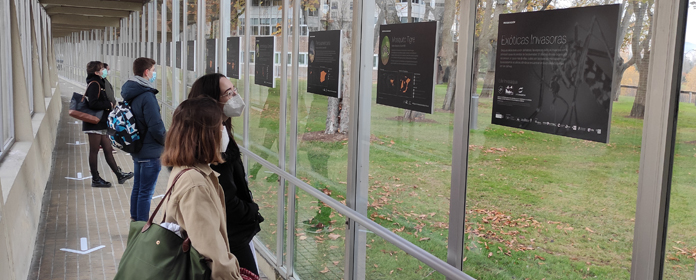The campus researches grape quality
The Genoma España Foundation finances a project in which the department of Plant Physiology of the University participates.
"A genomic approach for the identification of genetic and environmental components underlying grape quality". This is the degree scroll of the project of research and development funded by Genoma España in which the department of Plant Physiology of the School of Sciences of the University of Navarra participates.
In three years, the Genoma España Foundation will provide two million euros to identify the genes responsible for grape quality. Six groups of researchers are working on this project, focusing their studies on table grapes. Specifically, the Moscatel Hamburg table grape variety will be analyzed. At the same time, the same study will be carried out in Canada on Cabernet Sauvignon wine grapes.
At the University of Navarra, the research team led by Dr. Manuel Sánchez-Díaz participates in the project by providing a model cultivation method developed in their laboratories: from a cuttings, in four months a plant with its grape bunch is obtained. These plants can be cultivated under the environmental variability conditions required and form the basis for subsequent genetic studies in other centers that make up the project: committee Superior de Investigaciones Científicas, Centro Nacional de Biotecnología, Universidad de Alicante, Institutos de Investigaciones Agrarias de Murcia, Madrid and board de Andalucía.
Grapes in four months, fruit of a doctoral thesisManuel Sánchez-Díaz explains: "Four months after planting a vine shoot in a small pot, we obtain a bunch of grapes similar to those produced by the vine. Therefore, three harvests a year are obtained". This model was developed, with another grape variety on a vine disease, during Eva Santamaría's doctoral thesis . For his part, José Miguel Martínez Zapater, researcher principal of project, was precisely looking for a similar model , of controlled and rapid cultivation in which the environmental conditions could be fixed and homogeneous series could be obtained.
For years, the University of Navarra has been conducting programs of study on grapevine. It works in partnership with the Estación de Viticultura y Enología de Navarra (EVENA) and with the Universities of Bordeaux.
The Genoma España Foundation, a state public entity in which companies collaborate, seeks to promote research in genomics and, therefore, have an impact on the development of biotechnology in Spain.
The 195,000 euros that correspond to the contribution to the University of Navarra in this project will be invested in new greenhouses to facilitate the research work of the department of Plant Physiology. For now, the Moscatel Hamburgo shoots are waiting in the cold storage chambers to be planted to begin the project that will reveal the genomic basis of grape quality and the modifications that the environment produces in the final quality.




